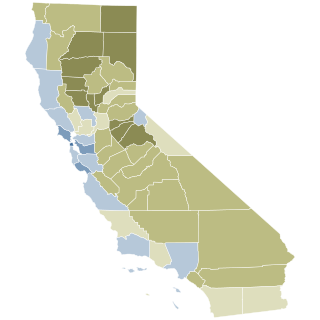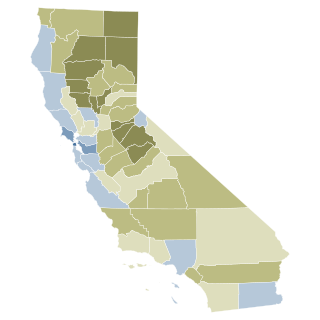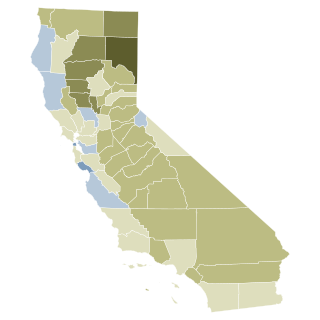
Proposition 13 is an amendment of the Constitution of California enacted during 1978, by means of the initiative process. The initiative was approved by California voters on June 6, 1978. It was upheld as constitutional by the United States Supreme Court in the case of Nordlinger v. Hahn, 505 U.S. 1 (1992). Proposition 13 is embodied in Article XIII A of the Constitution of the State of California.

The California state elections, 2006 took place on November 7, 2006. Necessary primary elections were held on June 6. Among the elections that took place were all the seats of the California's State Assembly, 20 seats of the State Senate, seven constitutional officers, and all the seats of the Board of Equalization. Votes on retention of two Supreme Court justices and various Courts of Appeal judges were also held. Five propositions were also up for approval.

California Proposition 87 was a proposition on the ballot for California voters for the November 7, 2006 general election, officially titled Alternative Energy. Research, Production, Incentives. Tax on California Oil Producers. It was rejected by the voters, 54.7% opposed to 45.3% in favor. This was highest-funded campaign on any state ballot and surpassing every campaign in the country in spending except the presidential contest.

Proposition 218 is an adopted initiative constitutional amendment which revolutionized local and regional government finance and taxation in California. Named the "Right to Vote on Taxes Act," it was sponsored by the Howard Jarvis Taxpayers Association as a constitutional follow-up to the landmark property tax reduction initiative constitutional amendment, Proposition 13, approved in June 1978. Proposition 218 was approved and adopted by California voters during the November 5, 1996, statewide general election.

Proposition 3 is a law that was enacted by California voters by means of the initiative process. It is a bond issue that authorizes $980 million in bonds, to be repaid from state's General Fund, to fund the construction, expansion, remodeling, renovation, furnishing and equipping of children's hospitals. The annual payment on the debt authorized by the initiative is approximately $64 million a year. Altogether, the measure would cost about $1.9 billion over 30 years out of California's general fund.

California Proposition 5, or the Nonviolent Offender Rehabilitation Act was an initiated state statute that appeared as a ballot measure on the November 2008 ballot in California. It was disapproved by voters on November 4 of that year.

California Proposition 19 was a ballot initiative on the November 2, 2010, statewide ballot. It was defeated, with 53.5% of California voters voting "No" and 46.5% voting "Yes." If passed, it would have legalized various marijuana-related activities, allowed local governments to regulate these activities, permitted local governments to impose and collect marijuana-related fees and taxes, and authorized various criminal and civil penalties. In March 2010, it qualified to be on the November statewide ballot. The proposition required a simple majority in order to pass, and would have taken effect the day after the election. Yes on 19 was the official advocacy group for the initiative and California Public Safety Institute: No On Proposition 19 was the official opposition group.

Proposition 39 is a ballot initiative in the state of California that modifies the way out-of-state corporations calculate their income tax burdens. The proposition was approved by voters in the November 6 general election, with 61.1% voting in favor of it.

Proposition 30, officially titled Temporary Taxes to Fund Education, is a California ballot measure that was decided by California voters at the statewide election on November 6, 2012. The initiative is a measure to increase taxes to prevent US$6 billion cuts to the education budget for California state schools. The measure was approved by California voters by a margin of 55 to 45 percent.

Proposition 51 is a California ballot proposition that passed on the November 8, 2016 ballot, regarding $9 billion in bonds to fund construction and improvement of K-12 and community college facilities. The measure designates $7 billion for K-12 projects falling under four types of projects, and $2 billion for any facility project for community colleges. No other bond measures related to education have been on the California ballot since 2006.

Proposition 55 is a California ballot proposition that passed on the November 8, 2016 ballot, regarding extending by twelve years the temporary personal income tax increases enacted in 2012 on earnings over $250,000, with revenues allocated to K–12 schools, California Community Colleges, and, in certain years, healthcare. Proposition 55 will raise tax revenue by between $4 billion and $9 billion a year. Half of funds will go to schools and community colleges, up to $2 billion a year would go to Medi-Cal, and up to $1.5 billion will be saved and applied to debt.

Proposition 62 was a California ballot proposition on the November 8, 2016, ballot that would have repealed the death penalty and replaced it with life imprisonment and forced labor without possibility of parole. It would have applied retroactively to existing death sentences and increased the portion of life inmates' wages that may be applied to victim restitution.

The 2016 Proposition 63, titled Firearms and Ammunition Sales, is a California ballot proposition that passed on the November 8, 2016 ballot. It requires a background check and California Department of Justice authorization to purchase ammunition, prohibits possession of high-capacity ammunition magazines over ten rounds, levies fines for failing to report when guns are stolen or lost, establishes procedures for enforcing laws prohibiting firearm possession by specified persons, and requires California Department of Justice's participation in the federal National Instant Criminal Background Check System.

The Road Repair and Accountability Act of 2017, also known as the "Gas Tax", is a California legislative bill that was passed on April 6, 2017 with the aim of repairing roads, improving traffic safety, and expanding public transit systems across the state. The approval of the fuel tax was for a projected $52.4 billion, or $5.24 billion per year, to be raised over the next 10 years to fund the state's infrastructure. The bill passed primarily along party lines, with most Democrats supporting the bill while most Republicans were against it. The bill passed with a vote of 27–11 in the Senate and 54–26 in the Assembly. According to California Department of Transportation, for maintenance projects on state highways, while providing funding to enhance trade corridors, transit, and active transportation facilities, in addition to repairing local streets and roads throughout California.

California Proposition 6 was a measure that was submitted to California voters as part of the November 2018 election. The ballot measure proposed a repeal of the Road Repair and Accountability Act, which is also known as Senate Bill 1. The measure failed with about 57% of the voters against and 43% in favor.

California Proposition 69 was a legislatively referred constitutional amendment that appeared on ballots in California in the June primary election in 2018. This measure put the revenue from the Road Repair and Accountability Act, which increased fuel taxes, in a "lockbox" so that it can only be used for transportation-related purposes. It also exempts said gas tax revenue from the previously existing appropriations mandate and expenditures limit. This state constitution amendment ensures that revenues from SB1 Gas Taxes established by the Road Repair and Accountability Act of 2017 can only be used for transportation-related purposes.

California Proposition 15 was a failed citizen-initiated proposition on the November 3, 2020, ballot. It would have provided $6.5 billion to $11.5 billion in new funding for public schools, community colleges, and local government services by creating a "split roll" system that increased taxes on large commercial properties by assessing them at market value, without changing property taxes for small business owners or residential properties for homeowners or renters. The measure failed by a small margin of about four percentage points.

California Proposition 19 (2020), also referred to as Assembly Constitutional Amendment No. 11, is an amendment of the Constitution of California that was narrowly approved by voters in the general election on November 3, 2020, with just over 51% of the vote. The legislation increases the property tax burden on owners of inherited property to provide expanded property tax benefits to homeowners ages 55 years and older, disabled homeowners, and victims of natural disasters, and fund wildfire response. According to the California Legislative Analyst, Proposition 19 is a large net tax increase "of hundreds of millions of dollars per year."

Colorado Proposition EE was a legislative referendum that appeared on ballots in Colorado in the November 2020 elections. It was a proposal to increase taxes on nicotine products and place a new tax on vaping products.

Proposition 30 is a California ballot proposition that appeared in the general election on November 8, 2022. The measure was defeated. The initiative would have raised taxes on the wealthy to fund wildfire management and electric vehicle incentives and infrastructure.












